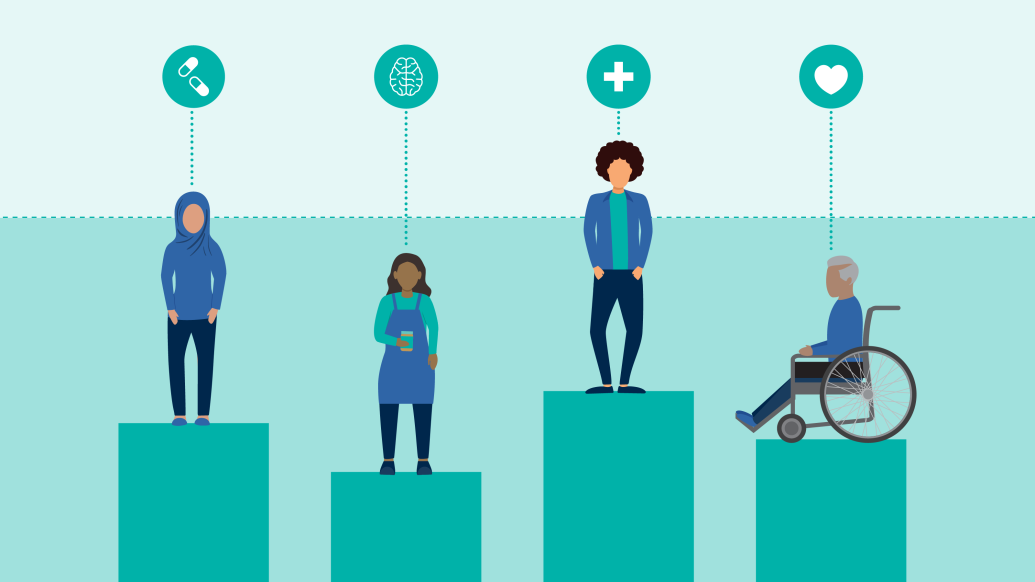Making health care and health outcomes more equitable in the U.S.
Health care disparity had been felt for centuries by Black, Hispanic, Native American, and other marginalized groups

This disparity had been felt for centuries by Black, Hispanic, Native American, and other marginalized groups, with researchers documenting these inequalities since the 1960s. (CREDIT: Emily Smith, University of Michigan)
In 2003, Americans became acutely aware of the profound disparities in the U.S. healthcare system. A landmark report titled "Unequal Treatment," released by a prestigious group of experts, highlighted the stark differences in healthcare access and quality experienced by people of different racial and ethnic backgrounds, despite having similar income levels or insurance coverage. This disparity had been felt for centuries by Black, Hispanic, Native American, and other marginalized groups, with researchers documenting these inequalities since the 1960s.
The release of "Unequal Treatment" brought these issues to the forefront of national consciousness, prompting significant policy responses, including aspects of the Affordable Care Act and Medicaid expansion, aimed at reducing the number of uninsured individuals across all demographics.
Fast forward to today, and the question remains: Has inequality in healthcare decreased? A recent report, "Ending Unequal Treatment," released by the National Academies of Science, Engineering, and Medicine, suggests some progress but emphasizes that much work remains. Dr. John Z. Ayanian, a key author of the report and a leader in health care research and policy at the University of Michigan, reflects on the findings.
"More than 20 years later, our committee found there’s been some progress, but it’s been uneven and incomplete in eliminating health care disparities and promoting health equity," Ayanian states. He underscores the link between healthcare inequities and health outcomes, a connection now more evident through comprehensive data.
The data clearly show that healthcare inequality adversely affects health outcomes. Ayanian notes, "We find that racial and ethnic inequities remain a fundamental flaw of the U.S. health care system, and that they’re driven by complex interactions between a variety of forces." He highlights specific strategies proven to enhance health equity, such as involving community health workers with individuals managing chronic conditions or health-related social needs. However, these strategies have not been widely implemented or sustained enough to make a significant impact.
The committee's report also warns that certain policy developments could introduce new obstacles, despite past progress. To address these challenges, the committee recommends several key actions:
- Diversifying Healthcare Workforces: Continuing efforts to ensure healthcare and health services research workforces better represent the U.S. population.
- Comprehensive Efforts for Health Equity: Moving beyond incremental changes to adopt successful models, like New York City's increase in colorectal cancer screenings among Asian, Black, and Hispanic residents, more broadly.
- Research and Evaluation: Conducting more in-depth research to understand inequality and drive improvements, highlighted during a special panel at the recent national AcademyHealth meeting.
- Enforcing Anti-Discrimination Laws: Enhancing awareness of the process for filing discrimination complaints under the Affordable Care Act, with information accessible in multiple languages.
- Standards for Nonprofit Hospitals: Establishing clearer reporting standards through the IRS and the Department of Treasury for nonprofit hospitals to detail their efforts in addressing community health needs.
- Health Insurance Accessibility: Advocating for Congressional action to ensure affordable health insurance for everyone, including Medicaid expansion in all states and coverage for immigrants regardless of status.
- Equal Medicaid Payments: Pushing for equal Medicaid payments to physicians and hospitals compared to Medicare, to increase physician acceptance of Medicaid patients.
- Funding the Indian Health Service: Fully funding the Indian Health Service to better serve Native American and Alaska Native populations.
- Addressing Medicaid Gaps in U.S. Territories: Ensuring Medicaid funding and coverage for territories like Puerto Rico and American Samoa match that of the 50 states and D.C.
- Improving Data Collection: Establishing new standards for collecting race and ethnicity data across federal healthcare programs.
- Expanding Demonstration Projects: Increasing demonstration projects that address health-related social needs.
The report and its recommendations are detailed further in a piece in Health Affairs Forefront and were discussed in a related webinar.
Ayanian points out that the report's release coincides with a critical period marked by the COVID-19 pandemic, which highlighted and exacerbated existing disparities. The pandemic not only increased overall death rates but reversed over a decade of progress in closing life expectancy gaps between racial and ethnic groups. Before 2020, Black and Native American life expectancy was approaching that of white Americans, and Hispanic Americans had surpassed it. However, COVID-19 disproportionately affected people of color, resulting in significantly higher premature death rates.
The economic impact of health care inequity is substantial, as is the injustice it perpetuates. Ayanian hopes that this new report will guide effective policy and practice changes in the coming years, similar to how the original "Unequal Treatment" report spurred action over the past two decades. "We hope this report will be a guide for effective changes in policy and practice for years to come, just as the original report was used to motivate such efforts over the past 20 years," he says.
Note: Materials provided above by the The Brighter Side of News. Content may be edited for style and length.
Like these kind of feel good stories? Get the Brighter Side of News' newsletter.



